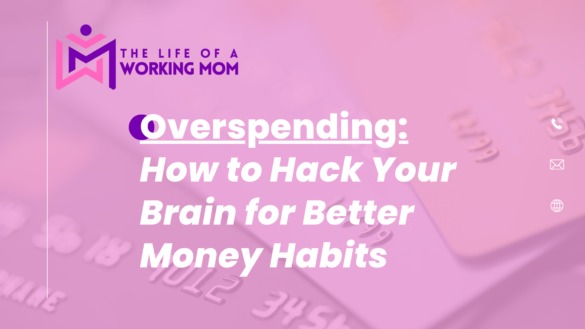Do you ever find yourself wondering where all your money went at the end of the month? Overspending is a common issue, and it’s often tied to habits and emotions rather than just numbers on a spreadsheet. The good news? By understanding how your brain works, you can outsmart it and build better money habits. Here’s how.
1. Recognize the Psychology Behind Spending
Your brain is wired to seek pleasure and avoid pain. When you buy something new, your brain releases dopamine, the “happy chemical” that gives you a rush of satisfaction. Unfortunately, this rush is short-lived, leading to a cycle of spending to chase that feeling again.
Hack: Practice mindfulness. Before making a purchase, pause and ask yourself, “Do I really need this, or am I just chasing a dopamine hit?” Writing down your thoughts can also help you make more rational decisions. You can also try creating a “cooling-off” list where you write down items you want to buy but wait 30 days before purchasing. Often, the urge to buy diminishes over time.
2. Set Clear Goals to Redirect Your Focus
When your financial goals are vague, it’s easy to justify impulse purchases. However, clear and specific goals give your brain a reason to delay gratification.
Hack: Create SMART goals (Specific, Measurable, Achievable, Relevant, Time-bound). For example, instead of saying, “I want to save money,” say, “I will save $500 in the next three months for a vacation.” Visual reminders, like a picture of your goal, can also keep you motivated. Additionally, break larger goals into smaller milestones. For instance, saving $500 might mean setting aside $42 each week, which feels more manageable.
3. Understand Your Spending Triggers
Many people overspend due to emotional triggers like stress, boredom, or even celebration. Retail therapy may feel good in the moment, but it often leads to buyer’s remorse.
Hack: Identify your triggers and develop alternative coping strategies. For instance, if stress makes you shop, try going for a walk or practicing deep breathing instead. Journaling about your emotions or talking to a friend can also be a helpful outlet. If boredom is a trigger, consider engaging in a hobby or reading a book to distract yourself. Apps that track your mood and spending patterns can also provide valuable insights, helping you identify patterns you might not notice otherwise.
4. Use Technology to Your Advantage
Your brain loves convenience, which is why one-click purchases and auto-filled payment details make it so easy to overspend. But you can turn the tables by using technology to help you save instead.
Hack: Use budgeting apps like Mint or YNAB (You Need A Budget) to track your spending. Set up alerts for when you’re close to your budget limits. You can also use browser extensions like Honey to find discounts or tools like Paribus to get refunds for price drops. Another option is to automate your savings by setting up recurring transfers to a savings account. This way, you’re prioritizing saving before you even have the chance to spend.
5. Build New Habits Through Repetition
Habits are formed through repetition, and breaking old spending habits requires consistency. Your brain craves routine, so the more you practice mindful spending, the easier it becomes.
Hack: Start small. Commit to one change at a time, such as bringing lunch from home instead of eating out. Over time, these small changes will add up to significant savings. Pair your new habits with existing ones—for example, every time you make coffee at home, transfer $5 into your savings account. Over time, these micro-habits will create a ripple effect in your finances.
6. Create Barriers to Impulse Buying
The easier it is to spend, the more likely you are to do it. By creating barriers, you give your brain time to reconsider.
Hack: Delete saved credit card information from online shopping accounts. Implement a 24-hour rule for non-essential purchases—if you still want it after a day, it might be worth buying. You can also use cash for discretionary spending to make transactions feel more tangible. Another strategy is to unsubscribe from promotional emails and limit your exposure to ads, reducing the temptation to buy things you don’t need.
7. Reward Yourself Strategically
Your brain thrives on rewards, so it’s important to celebrate financial wins. The key is to reward yourself in ways that don’t derail your progress.
Hack: Set milestones for your savings goals and celebrate when you reach them. For example, treat yourself to a movie night at home instead of an expensive outing. This reinforces positive behavior without breaking the bank. Consider creating a “fun fund”—a small, separate savings account specifically for guilt-free indulgences. Knowing you have this cushion can make it easier to stick to your overall budget.
3 Key Takeaways from the Article:
- Understand Your Spending Triggers: Emotional states like stress, boredom, or celebration often lead to impulsive spending. Recognizing these triggers and finding healthier coping mechanisms, such as journaling or engaging in hobbies, can help you break the cycle of overspending.
- Set Clear Financial Goals: Specific and measurable goals give your brain a reason to delay gratification. Use SMART goals and visual reminders to stay focused, and break larger goals into smaller, manageable milestones.
- Create Barriers to Impulse Buying: Simplifying access to money can encourage overspending. Implement strategies like the 24-hour rule for non-essential purchases, removing saved credit card details from online accounts, and using cash for discretionary spending to create a thoughtful buffer before making purchases.
To Conclude:
Hacking your brain for better money habits isn’t about deprivation—it’s about making intentional choices that align with your goals. By understanding the psychology behind your spending and implementing these hacks, you can take control of your finances and build a more secure future.
Remember, small changes can lead to big results. Start with one or two hacks that resonate with you and build from there. Your wallet (and your future self) will thank you!


